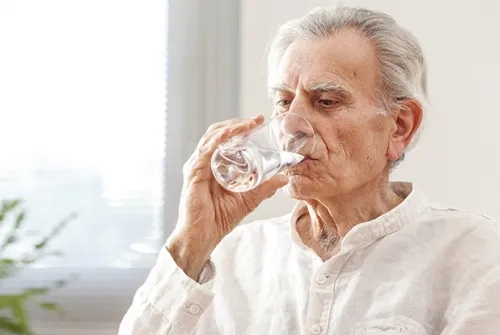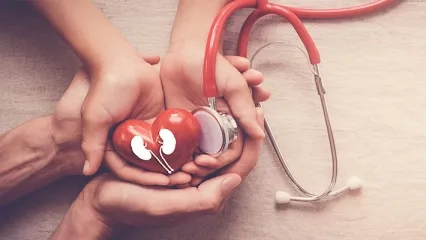Alo Yeditepe
Alo Yeditepe
Being Thirsty in the Heat Tires the Kidneys!
There is a loss of fluid in our body due to hot weather, sweating, and breathing through our lungs. Our kidneys try to balance this by increasing water absorption. Nephrologist Prof. Dr. Abdullah Özkök, who pointed out that acute kidney damage may develop if sufficient water is not available for a long time, made important warnings for both healthy and patients with kidney disease.
Reminding that thirst is one of the strongest reflexes in humans and is managed directly by the brain, Yeditepe University Hospitals Nephrology Specialist Prof. Dr. Abdullah Özkök said that adequate fluid intake is important for all organs, especially in hot weather, but it is much more important, especially for kidney health.
Prof. Dr. Abdullah Özkök, who explained that symptoms such as nausea, vomiting, weakness, and muscle pain may develop when kidney damage due to thirst develops, pointed out that in this case, kidney function tests may need to be checked, and intravenous fluids may need to be given, especially in people with kidney disease.
Being Dehydrated Is Much Riskier in Chronic Kidney Patients
Yeditepe University Kozyatağı Hospital Internal Medicine and Nephrology Specialist Prof. Dr. Özkök pointed out that especially chronic kidney patients should be more careful in the heat and provided the following information on the subject: "The kidneys of chronic kidney patients are more sensitive than normal people and can deteriorate more quickly. So, thirst is more dangerous for these patients. For this reason, we advise chronic kidney patients not to go under the sun, especially in summer, and increase their fluid intake. In addition, it is more difficult for our patients with heart failure and using high-dose diuretics to maintain fluid balance in very hot temperatures in the summer. Doses of diuretic drugs will be adjusted by physicians following these patients. People with kidney stones should remember that they may experience kidney stone problems more often when they are dehydrated. Therefore, especially these patients should drink plenty of water to urinate 2-2.5 liters per day."
Kidney Patients on Dialysis Should Have Fluid Restriction
Although fluid consumption is important for kidney patients, Prof. Dr. Abdullah Özkök underlined that this situation is the opposite in people undergoing dialysis, and listed his warnings for this group of patients as follows:
"We normally recommend fluid restriction in this patient group due to lack of urine output in many of our dialysis patients. Because if too much fluid is taken, hypertension and heart problems may occur due to excess fluid accumulated in the body. In addition, we recommend that these patients do not go out too much at high temperatures, and we loosen the fluid restriction a little. Since the immune system is suppressed, our kidney transplant patients should make sure that the water they drink is clean and, if possible, they should consume bottled and closed water. We also do not want our patients to stay in the sun or the heat for long periods, and we strongly recommend that they use protective sunscreen."
Do Not Quench Your Thirst with Sugary Drinks!
Prof. Dr. Abdullah Özkök said that trying to quench thirst with sugary drinks in hot weather may increase kidney damage and cited a study on Central American farmers who worked in the heat for a long time as an example. "Studies have been conducted in sugar beet fields in Central America on the increase in the frequency of kidney failure in people who work under extreme heat for a long time, and it has been found that kidney disease in these patients may be due to recurrent heat stress. This may also apply to construction workers and other workers who work outdoors for a long time in the summer. However, it has been shown that farmers' efforts to quench their thirst with sugary drinks greatly increase kidney damage. In hot weather, we should definitely not prefer very sugary beverages containing fructose-glucose syrup. Clean water is the best drink."
Drink the Water from the Glass Bottle!
Reminding that microplastics that can pass from plastic bottles into the water may also be harmful to health, Yeditepe University Kozyatağı Hospital Internal Medicine, and Nephrology Specialist Prof. Dr. Özkök said that it is therefore appropriate to drink water from glass bottles or glass carboys if possible. Stating that soda can be found among the liquids that can be drunk during the day to quench thirst, Prof. Dr. Özkök said, "But you should not drink more than 1 bottle per day. Especially those with hypertension and kidney stones should prefer soda containing low sodium."
Too Much Water Is Harmful!
Prof. Dr. Abdullah Özkök said, "There is also a multiplicity and scarcity in the water issue" and stated that the statement "It is healthy to drink a lot of water" was wrong and explained the issue as follows: "As I mentioned, the feeling of thirst is a very strong urge in a person. We do not expect thirst-related kidney disease in a person who drinks enough water when thirsty. However, too much water is harmful. As a result of "water poisoning", we may encounter serious conditions called hyponatremia in the clinic. We should also avoid extremes in this regard. If you drink water when you're thirsty and urinate about 2-2.5 liters per day, you're providing enough hydration for your body."
Press Coverage: gazeteduvar | t24 | halktv | aksam | yenicaggazetesi | star | cnnturk | oncevatan | yenicaggazetesi | penceretv | yenicaggazetesi
This content was prepared by Yeditepe University Hospitals Medical Editorial Board.
”
See Also
- What is Hypoglycemia?
- Common Misconceptions About Kidney Transplantation
- 10 Questions About Kidney Transplantation
- Misconceptions About Hypertension
- Chronic Kidney Disease and Treatment Methods
- What is Hypertension?
- AV FISTULA Should Be Done At The Right Time For Hemodialysis Patients
- He Held On To Life with His Brother's Kidney
- He Lost 20 Kilograms in 40 Days for His Wife
- One Out of Every Seven People Has Kidney Disease
- Are Your Kidneys Really Healthy?
- Tissue Harmony Is Also Important for Success in Kidney Transplant
Alo Yeditepe





